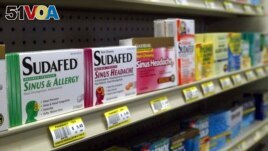14 September 2023
American government experts who studied a popular medicine used for colds say the drug is likely not effective and should not be taken by mouth.
Sixteen experts for the U.S. Food and Drug Administration examined the drug phenylephrine. The drug is in many medicines that treat nasal congestion, a condition also known as a stuffy nose. The medicines include Sudafed, Allegra and Dayquil among others.
The experts read a scientific review released by the FDA before they met. The scientific study said there were many mistakes in earlier tests of phenylephrine's effectiveness. It said the FDA no longer accepted the earlier testing results.

FILE - On Sept. 12, 2023 advisers to the Food and Drug Administration said that an ingredient, phenylephrine, is ineffective at relieving nasal congestion. Shown here is Sudafed containing another ingredient at Hospital Discount Pharmacy in 2005.
One of the experts was Dr. Mark Dykewicz. He is an allergy specialist at Saint Louis University School of Medicine. Dykewicz said, "Modern studies, when well conducted, are not showing any improvement in congestion with phenylephrine."
Phenylephrine is an over-the-counter drug. Anyone can buy it at a store. A doctor's order is not required to purchase it. Phenylephrine is the most popular decongestant in a market valued at $2.2 billion dollars.
If the FDA follows the advice of the experts, companies that make the medicine will have to remove it from stores. These companies include Johnson & Johnson, Bayer and other leading drug makers.
The drug would remain in medicines taken through the nose, however. The nasal spray form of phenylephrine is considered effective and there are no plans to review it.
But offering higher amounts of the drug by mouth is not possible because it can increase blood pressure to dangerous levels.
Researchers at the University of Florida first requested that the FDA remove phenylephrine from a list of approved drugs. The same researchers questioned the drug's effectiveness in 2007. They said they found no difference between using the drug and using an inactive substance called a placebo.
Phenylephrine has been sold in different forms for 75 years. Dr. Theresa Michele leads the FDA's office of nonprescription drugs. She said, "Any time a product has been on the market that long, it's human nature to make assumptions about what we know about the product."
The FDA reviewers said the studies they examined showed how quickly the body processes phenylephrine. The research shows that too little of the drug reaches the area of the nose when the medicine is taken by mouth. Forms of the drug sprayed into the nose appear more effective.
The reviewers said barring the drug from medicine taken by mouth would avoid the "unnecessary costs and delay in care of taking a drug that has no benefit.
The FDA has not updated its list of approved drugs to treat nasal congestion since 1995. The process for changing the list takes years. But Congress passed a law in 2020 that would speed the process for drugs that do not require a doctor's permission to use.
I'm Caty Weaver.
Matthew Perrone reported this story for the Associated Press. Mario Ritter, Jr. adapted it for VOA Learning English.
___
Words in This Story
congestion –n. (medical) blocked with fluid
pharmacist –n. a person whose job it is to prepare and sell drugs that doctors order for their patients
spray –n. liquid that is forced out of a container in very small drops
assumption –n. something that a person thinks is true but of which they have no proof
no benefit –phrase something that does not have a useful or good result













